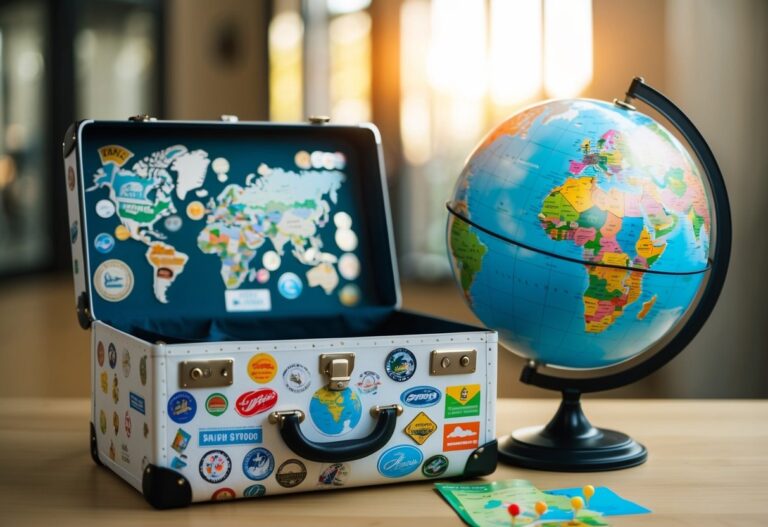People love to travel for many reasons. It’s a chance to see new places, try different foods, and meet people from all over the world.
Travel opens our eyes to new ways of life and helps us grow as people.

Traveling lets us step out of our daily routines and experience life in fresh ways.
We learn about other cultures, see amazing sights, and make memories that last a lifetime. Whether it’s a beach trip, a city break, or an adventure in nature, travel offers something for everyone.
Travel can also strengthen our relationships.
Going on trips with family or friends creates shared experiences and brings people closer together. Even solo travel can lead to new friendships with fellow travelers or locals we meet along the way.
Key Takeaways
- Travel broadens perspectives and creates lasting memories
- Exploring new places offers excitement and personal growth
- Trips can strengthen bonds with loved ones or lead to new friendships
The Universal Appeal of Travel
Travel captivates people from all walks of life. It offers unique experiences that enrich the mind, body, and soul. People find joy in exploring new places and cultures.

Psychological Benefits
Travel boosts mental health and well-being. It reduces stress and anxiety by breaking daily routines.
New experiences stimulate the brain, improving cognitive function.
Vacations provide a chance to relax and recharge. This leads to increased productivity upon return.
Travel also enhances creativity by exposing people to different perspectives.
Wishful thinking is a key part of travel.
Planning trips gives people something to look forward to, increasing happiness.
Cultural Enrichment
Experiencing different cultures broadens horizons. Travelers gain a deeper understanding of global diversity. This fosters empathy and tolerance for others.
Trying new foods, music, and art expands cultural knowledge. Language barriers become opportunities for growth.
Interacting with locals provides authentic insights into different ways of life.
Travel opens minds to new ideas and perspectives. It challenges preconceptions and stereotypes.
This leads to a more nuanced worldview and increased cultural appreciation.
Personal Growth Opportunities
Travel pushes people out of their comfort zones. It builds confidence and independence.
Navigating unfamiliar places develops problem-solving skills.
Overcoming challenges during trips boosts self-reliance. Language barriers and cultural differences become opportunities for personal development.
These experiences foster adaptability and resilience.
Self-reflection often occurs while traveling. Being away from familiar surroundings prompts introspection.
This can lead to clarity about personal values, goals, and priorities.
Exploration and Adventure
People travel to discover new places and experience thrilling adventures. Exploring unfamiliar destinations and seeking out exciting activities are key reasons why many love to travel.

Seeking New Experiences
Travel lets people step out of their comfort zones and try new things. Visitors can explore different cultures through food, music, and customs.
They might learn a new language or skill.
Adventure seekers can try exciting activities like:
• Skydiving
• Scuba diving
• Bungee jumping
• White water rafting
These adventures create lasting memories and stories to share. Travelers often feel a sense of achievement after facing fears or challenges.
Natural and Historical Wonders
Many people travel to see amazing natural and man-made sights. Witnessing the Northern Lights or watching a sunrise over ancient ruins can feel magical.
Popular natural wonders include:
• The Grand Canyon
• Great Barrier Reef
• Amazon Rainforest
Historical sites attract millions of visitors each year:
• The Great Wall of China
• Machu Picchu
• The Pyramids of Giza
These places offer a chance to learn about history, geology, and different cultures. Seeing world-famous landmarks in person often leaves a lasting impact on travelers.
Social and Relationship Building
Travel creates opportunities to meet new people and strengthen existing relationships. It fosters connections across cultures and deepens bonds with travel companions.
Making New Friends
Traveling opens doors to meeting people from all walks of life. Hostels, tours, and local events are great places to connect with fellow travelers.
These chance encounters can lead to lifelong friendships.
Shared experiences create strong bonds quickly. Exploring a new city or facing travel challenges together builds camaraderie.
Many travelers find it easier to open up to new people while away from home.
Language exchange meetups and volunteer programs offer ways to meet locals.
These interactions provide insights into different cultures and ways of life. Some travelers even find romantic partners during their journeys.
Strengthening Bonds
Traveling with friends or family can deepen relationships. Shared adventures build trust and create lasting memories.
Overcoming obstacles together strengthens teamwork and communication skills.
Couples often find that travel reignites their relationship. New experiences can spark romance and foster intimacy.
Exploring unfamiliar places together creates a sense of shared discovery.
Family trips help parents and children connect away from daily routines. They provide quality time for bonding and learning about each other. Siblings often grow closer through travel experiences.
Group travel can strengthen friendships. Planning trips and sharing costs builds collaboration.
Friends learn about each other’s interests and habits in new settings.
Escape and Relaxation
Travel offers a chance to break free from daily life and find peace. It lets people recharge and find new energy away from their usual surroundings.
Disconnecting from Routine
Many people travel to escape the daily grind.
Getting away from work, chores, and regular duties helps reduce stress. A change of scene can refresh the mind and body.
Travelers often enjoy:
- New sights and sounds
- Different foods and cultures
- Freedom from schedules
- Time away from digital devices
This break from routine allows for fresh thinking. It can spark new ideas and help solve old problems.
Wellness and Rejuvenation
Travel provides space for self-care.
Many choose trips that focus on health and relaxation. Popular options include:
- Spa retreats
- Yoga vacations
- Nature hikes
- Beach stays
These trips help people unwind and focus on their well-being. The change of pace allows for better sleep and less stress.
Travel can also boost mental health. New experiences create happy memories.
They give people something to look forward to and reflect on later.
Economic Impacts of Tourism
Tourism brings significant economic benefits to destinations worldwide. It creates jobs, generates income, and stimulates local development.
Let’s explore how tourism boosts economies and promotes sustainable practices.
Boosting Local Economies
Tourism creates jobs and generates income for local communities.
When travelers visit a place, they spend money on hotels, restaurants, and attractions. This spending supports businesses and workers in the area.
Tourism also brings in foreign money. Visitors exchange currency, which helps improve a country’s financial situation.
The money tourists spend can help build better roads, schools, and hospitals.
Many places rely on tourism as a key part of their economy. It can help areas that don’t have other big industries. Small towns and islands often depend on visitors to keep their economies strong.
Sustainable Travel Initiatives
Sustainable tourism aims to benefit local people while protecting the environment. Many places now focus on eco-friendly travel options.
These can include using clean energy, reducing waste, and protecting natural areas.
Sustainable travel practices can create long-term economic benefits. They help preserve natural resources that attract visitors.
This ensures tourism can continue to support local economies in the future.
Some initiatives involve local communities in tourism projects. This helps spread economic benefits more evenly.
It can also preserve local cultures and traditions, which become part of the tourist experience.
Frequently Asked Questions
Travel appeals to many people for different reasons. It offers opportunities for personal growth, cultural experiences, and stress relief.
Let’s explore some common questions about why people enjoy traveling.
What are the top motivations for people to travel?
People travel for various reasons. Many seek new experiences and want to explore unfamiliar places.
Others travel to relax and escape daily routines.
Some travelers are motivated by cultural immersion and learning about different ways of life. Adventure seekers look for thrilling activities in new environments.
How does traveling influence personal growth and development?
Travel promotes personal growth by exposing individuals to new challenges.
It helps develop problem-solving skills and adaptability.
Experiencing different cultures broadens perspectives and increases empathy. Travel often leads to self-discovery and a better understanding of one’s values and goals.
What are the psychological effects of travel on individuals?
Travel can reduce stress and improve mental well-being. It provides a break from daily pressures and allows for relaxation.
New experiences stimulate the mind and can boost creativity. Overcoming travel challenges can increase confidence and self-esteem.
Why has traveling become more prevalent in recent times?
Improved transportation options have made travel more accessible.
Lower costs of flights and accommodations have opened up opportunities for more people.
Social media has increased awareness of different destinations. Many people now prioritize experiences over material possessions, leading to more travel.
How does culture and society contribute to the popularity of traveling?
Many cultures value exploration and learning about the world. Some societies see travel as a status symbol or rite of passage.
Globalization has increased curiosity about other cultures. Work cultures that offer paid vacation time encourage people to travel.
Why do some individuals prefer staying home over traveling?
Some people find comfort in familiar surroundings. Others may have anxiety about unfamiliar places or situations.
Financial constraints can limit travel opportunities. Family or work responsibilities may make it difficult for some to leave home.

